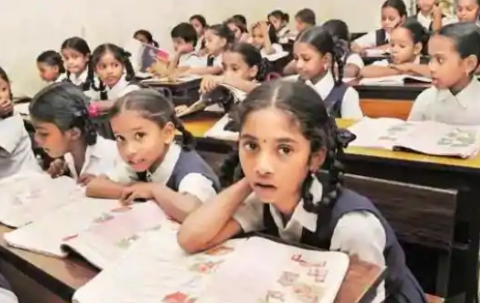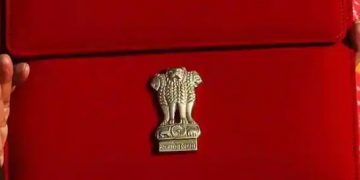Dr. SN Misra & Sanjaya Kumar Ghadai
The 86th Amendment to the Constitution made free and compulsory education to all children in the age of 6-14 a Fundamental Right. However, early childhood care and education remained as an unenforceable mandate for the state to children between 3-6 years. This has denied around five crore children in the age group of 3-6 the benefit of non-formal learning and proper nourishment, before they step into formal learning.
The Kasturirangan Committee has duly noted this serious deficit and implored the government to make early childhood care and education (ECCE) a fundamental right. The National Policy on Education, 2020, makes amends for the dichotomy in the 86th Amendment and paves the way for bridging the huge opportunity gap in pre-schooling between the affluent and the underprivileged. Besides, it also takes note of the recurring concern of ASER reports on how Right to Education Act, 2009, has been underperforming in terms of educational outcomes.
Stanley Wolpert, the eminent historian, calls education ‘the swiftest elevator for modern Indian power’. The Education Policy of India stood on the tripod of access, equity and quality. The National Policy on Education (1986 and 1992) focussed on access and equity, and less on promoting quality education. The RTE Act 2009 laid down the legal underpinning for Universal Elementary Education. The quality dimension has been a pivotal concern of UN’s Sustainable Development Goals (2015), to which India is a signatory. The present policy adds two more dimensions to the education policy, viz. affordability for all sections of society and accountability on part of all stakeholders like the state, planners and teachers.
The policy looks at a crucial element of early education, namely quality nutrition, where surveys by UNICEF ( Rapid Survey of Children) clearly reveal unacceptably high levels of malnutrition (38 per cent) among children, leading to stunting and wasting. Demographic dividend carries in its womb the seeds of disaster and deprivation. Since 80 per cent of a child’s cumulative brain development takes place before age 6, the policy has advocated provision of wholesome nutritious food with adequate protein intake, vitamins and micro nutrients to children who will be undergoing pre-schooling. The policy has set a target of achieving foundational literacy and numeracy by 2025, where ASER reports find close to 60 per cent and 70 per cent deficits respectively. It has also emphasised that besides foundational and numeracy skills, children have to develop cognitive skills (critical thinking) and soft skills like cultural awareness, as advocated by Joseph Nye.
In order to achieve such a transformative change, the policy advocates for standalone Anganwadis, co-located with primary schools, as also pre-primary schools co-located with primary schools and standalone pre-schools. It also laid emphasis on the importance of improving quality of infrastructure of Anganwadis and of well-trained teachers who can take the mandate of quality informal teaching in a joyful environment to fruition. The policy also looks at serious problems of high dropouts after children cross the age of eight.
As per UNESCO Institute of Statistics, close to 6.2 crore children were out of school in 2013. It also takes note of open distance learning which needs to be revamped and restructured; and looks at restructuring the curriculum by pooling children in the age group of 3-8 wherein they will have the benefit of foundational learning and activity based works, besides giving importance to team work. The policy takes note of the natural potential of children to learn a number of languages and suggests encouraging multi-lingualism in the age-group of 3-8. But it does seek to change the three language format. Use of technology has been recognised as a powerful tool to enhance learning, assessment and planning. During the present Covid times, the importance of online teaching has been clearly recognised. The study of open distance learning has brought out a few important deficiencies; firstly that teachers need to be comfortable while using ICT. Also, ease of use has been a major challenge as four students are given one PC, the maximum capacity of ICT lab being of 40 students. Many such centres do not have prescribed time table for ICT; and access and availability are limited. As Jenny Arledge observes, “Technology can become the wings that will allow the educational world to fly faster, if we allow it.”
Funding of education has been a serious problem, particularly after its universalisation. Due to poor funding of public schools, poor quality of school infrastructure, and poor accountability of teachers, there has been a significant rise in the number of children gravitating to private schools (30 per cent). The Kothari Commission had suggested that 6 per cent of GDP should be earmarked for education. The new policy notes that most states spend only 10 per cent of their total budget expenditure on education. The overall spending is around 4 per cent of GDP by the Centre and the states. The policy recommends that states should increase their spending to 20 per cent of their annual budget and 6 per cent of GDP, in a decade’s time. This is a welcome move. The policy also seems to put a premium on public education and strongly deplores commercialisation of education.
A mention may be made of the Birla-Ambani Report of 1999, where they had strongly pitched for total commercialisation and corporatisation of education. The present policy does not fall for such a market/business driven approach to education and considers early schooling and primary education as a merit. Economist Richard Musgrave had strongly suggested that quality early childhood education should be the predominant remit of governments. The spin-up of such expenditure on quality primary education will have a cascading effect later on in the knowledge economy that we straddle.
The recommendations of the policy are indeed salutary. However, since education is a concurrent subject, it remains to be seen how the state governments rise to the challenges of earmarking more funds for quality education. The experience so far reveals wide variation between states. Kerala, Delhi and Tamil Nadu spend nearly 25 per cent of their budget on education, while it is limited to 10 per cent in most other states. The decrepit infrastructure, poor IT support and indifferent teacher quality are a testimony to the poor educational outcomes. Therefore, a strong regulatory authority would be required to ensure that quality of curriculum and dispensation of teaching conform to the lofty objectives of promoting foundational, cognitive and other skills.
The world is rapidly changing as a knowledge landscape. Rise of big data, machine learning, and artificial intelligence is rendering many unskilled jobs redundant. There is a greater need for high- end skills. However, it has to be supplemented by exposure to liberal arts, character building and encouraging learners to be more ethical, rational, compassionate, caring and secular. The mind of a child is like a clean canvas. The effort should be not to crowd it with rote learning but to provide holistic education where arts, crafts, sports and science coalesce. The proposed paradigm shift in ECCE is most welcome.
SN Misra is a professor of Economics and Sanjaya Kumar Ghadai is a research scholar.






































